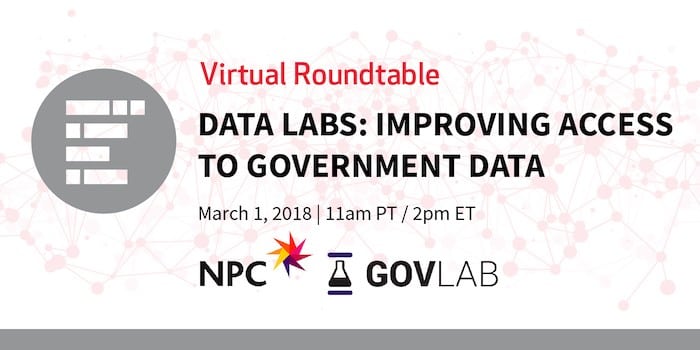Data practitioners discuss an emerging data-sharing model that helps dissolve barriers to collaboration while safeguarding sensitive data
The Data Labs project led by New Philanthropy Capital and the Governance Lab aims to make government administrative data more transparent, so that nonprofits can better understand the impact of their services on beneficiaries.
Governments collect and store massive amounts of data about a wide range of issues. Nonprofits often need better information about government actions to plan, provide, and evaluate their services. Yet, while government data might be useful to nonprofits, it’s often not easily available — within government or outside of it. Regulations meant to keep government in check can limit how data are shared and who has access. Privacy laws meant to protect citizens from government overreach are important. And nonprofits, who may benefit from seeing their work in light of broader public data insights, may not have the analytic skills or capacity to make sense of massive quantities of raw data.
Are Data Labs resilient enough to handle a rapidly changing regulatory environment? How can citizens trust government to do right by their data while also taking advantage of opportunities to use data to improve services and communities? In this conversation we heard examples of ways to strike this balance.
Audio Podcast and Transcript PDF
Download the transcript (PDF), watch the discussion using the media player, or listen by using the audio player below or by visiting the Digital Impact podcast on iTunes.
[powerpress]
Highlights
- Be vigilant: Charities need help to see and measure whether they are doing good with data and minimizing potential risks, especially given data’s potential to be a profitable resource. As charities, we need to be vigilant about thinking through how and why we are using data, how we should safeguard and prioritize data, and that we are always working toward social good.
- Be fearless: Groups need to be willing to open up their data and review impact; the analysis —feedback and qualitative research — is essential to the how, the why, and the for whom of evaluating progress and programs.
- Be informed: Sample size and effect size are issues for many charities that try to measure and understand statistical impact. A level of sophistication in interpretation is needed to make informed decisions.
- Be focused: Single point impacts may realistically be what many social impact programs should expect to have, based on big challenges and small data sets.
- There is a big push now for government to make the best use of the data already available: Although the Justice Data Lab is focusing on the not-for-profit sector and the work that it does, there’s actually a huge amount of data which government is in a position to mine without involving external agencies. Government should use its own data and also make that data available to vital nonprofit service providers. Well-crafted data resources should make that access better for both.
- Data and science can move the needle on society’s most challenging issues: A lot of great research often ends up sitting on a shelf. It could provide insight and impact for policy but the research isn’t translated into action for policy or evaluating new policy changes. RIIPL, for instance, starts with its government partners to define policy goals before using data to assess how current programs are performing, understand the challenges affecting target populations, and then use economics, behavioral economics and social science to generate insights that are fact-based and research-driven that suggest ways to improve.
- Time is of the essence: Building the systems to actually take data and put it into simplified, usable formats that inform decisions is essential to efficient and effective use of data, especially in policy and the social sector. Defining, researching and solving a policy problem needs to happen quickly, which means insights need to be generated quickly.
Speaker-Recommended Resources
- New Philanthropy Capital (NPC) and The Governance Lab
- UK Data Labs
- An overview, evaluation report, and resources related to the Data Labs project
- NPC and The Governance Lab Data Labs Programme
- The Data Labs news feed hosted by Medium
- UK Data Labs
- Prisoners’ Education Trust
- Justice Data Lab Re-Offending Analysis
- The most recent Justice Data Lab report analyzing the outcomes for prisoners
- What is Prison Education for?
- A theory of change exploring the value of learning in prison
- PLAN Website
- Prisoner Learning Academic Network
- Justice Data Lab Re-Offending Analysis
- Ministry of Justice’s Justice Data Lab
- Accessing the Justice Data Lab Service
- Information provided to organizations supporting the rehabilitation of offenders
- Accessing the Justice Data Lab Service
- General Data Protection Regulation (GDPR)
- What is the GDPR?
- Understanding and complying with GDPR data protection requirements
- Guide to the GDPR
- Guidance from the UK Information Commissioner’s Office (UK data protection and information rights regulator)
- What is the GDPR?
- Foundations for Evidence-Based Policymaking Act of 2017 (H.R. 4174)
- Our Opportunity for More Data-Driven Nonprofit Program Evaluation
- SSIR Article by Tracey Gyateng and Beth Simone Novek, January 2018
- H.R. 4174
- Congress.gov overview
- Our Opportunity for More Data-Driven Nonprofit Program Evaluation

